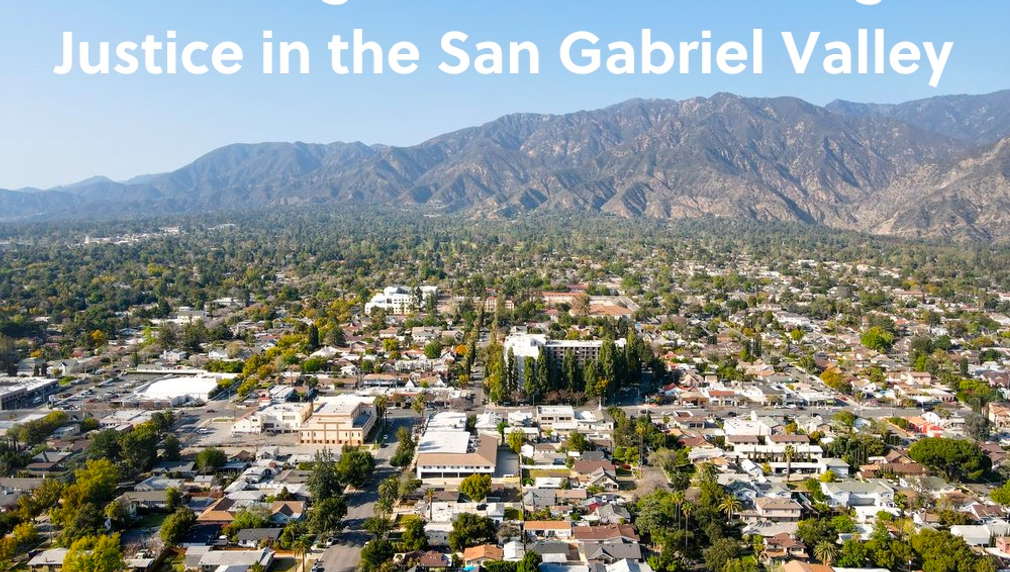Building Power for Housing Justice in the San Gabriel Valley
Our initiative is a collaboration of LA Forward, the People’s Resource Center, and SGV Tenants Alliance to build community power for housing justice through educating renters on their rights and on housing policy, growing their organizing and civic engagement skills through training workshops, building relationships within and across the region’s cities. We will also help to organize housing justice groups in different cities and supporting new and existing ones with research and technical support.

Please list the organizations collaborating on this proposal.
The People's Resource Center San Gabriel Valley Tenants Alliance
What is the primary issue area that your application will impact?
Housing and Homelessness
In which areas of Los Angeles will you be directly working?
San Gabriel Valley
In what stage of innovation is this project, program, or initiative?
Expand existing project, program, or initiative
What is your understanding of the issue that you are seeking to address?
Suburbia’s reality not does fit uniformly affluent, white image. Nowhere is that more true that the San Gabriel Valley, home to 1.8 million people. The suburban myth obscures not only the tremendous racial, ethnic, and class diversity, but also erases the rapidly worsening housing situation. The cost burden of housing is accelerating, especially for tenants, and housing insecurity and homelessness are growing rapidly. More people are living in overcrowded apartments even as building quality declines. School district data shows declining enrollment as families are displaced and increasing homelessness among students. The region’s 31 cities grant few legal protections to tenants. There aren’t significant resources or vehicles for solidarity available to renters facing housing insecurity. Renters aren’t well organized and they lack civic influence and a say in decision-making compared to homeowners even in tenant-majority cities.
Describe the project, program, or initiative this grant will support to address the issue.
Our initiative seeks to address the SGV’s worsening housing crisis by building the power of renters, who as a group are far more impacted by the crisis than the homeowners who generally wield power in the region’s cities. Building the power of tenants, within and across SGV cities, is crucial to shifting the systems and policies that favor the interests of the propertied to the detriment of those who rent their housing. This project is unique as regionwide and region-specific effort based on scaling up the existing collaborations among LA Forward, the People’s Resource Center, and SGV Tenants Alliance. The main part of our program seeks to educate tenants on their rights and on housing policy, help them grow their organizing and civic engagement skills through training workshop, and build community within and across the region’s cities. To accomplish this, we’ll host series of educational teach-ins and skill-building workshops for a cohort of SGV renters. We’ll also: Host two SGV-wide gatherings at a public park allowing people to meet in-person, develop relationships across cities, and participate in fun and artistic expressively activities like interactive City Visioning. Scale up our work to seed housing justice groups in different cities and support existing groups with research and technical support, as well as access to regional networks. Expand our efforts to engage and support nonprofits in doing housing justice work who historically have not touched it.
Describe how Los Angeles County will be different if your work is successful.
We dream of a LA County where every person lives affordable, high quality housing. Our work aims to build a knowledgeable, highly-skilled, and strongly connected base of tenants and allies in the SGV who are powerful enough to transform unjust housing systems. In this project, we seek to develop a cohort of 250 people who -- beyond the specific limits of this program -- are primed to advocate for real policy change at every level -- between tenants and individual landlords, and at municipal, county, and state government. In the short-term, we seek to grow the number low-income, tenant residents involved in housing issues and to support their growth leaders. We aim for their input and lived experience to be taken seriously as policy decisions are made. And through this power-building and policy shift, we envision displacement rates and the housing cost burden declining and the number of people living in de-commodified forms of housing to increase.
What evidence do you have that this project, program, or initiative is or will be successful, and how will you define and measure success?
This is an initiative to scale up the existing collaborations among LA Forward, the People’s Resource Center, and SGV Tenants Alliance. We will track metrics related to how many people are directly touched by our initiative as well as the broader outcomes that result. Short-term metrics: -Number of participants in our education and leadership development programs -Increase in participation of existing hyper-local SGV tenants/housing justice groups. -Increase in the number of hyper-local tenants/housing justice groups in SGV, especially in cities that lack a tenants/housing justice group. -Increase in housing/tenant events and actions by non-housing hyper local groups; -Increase in the number of tenants are civically active on housing issues
Approximately how many people will be impacted by this project, program, or initiative?
Direct Impact: 250
Indirect Impact: 50,000
Describe the specific role of the partner organization(s) in the project, program, or initiative.
LA Forward will act as the organizatiol backbone with Allison Henry serving as the lead staffer for maging the project overall. LAF will bring connections to subject matter experts across LA County and take the lead on the educatiol programming. LAF will also use its significant communications infrastructure to widely publicize the programs. SGV Tents’ Alliance will leverage its local network and brand to lead on recruitment and outreach for the initiative programs. It will serve as a key convening of the monthly workshops. People’s Resource Center brings a team of trained counselors to this project who have engaged low-income tent residents using restorative justice and resiliency building practices. PRC will lead on the skills-building curriculum.